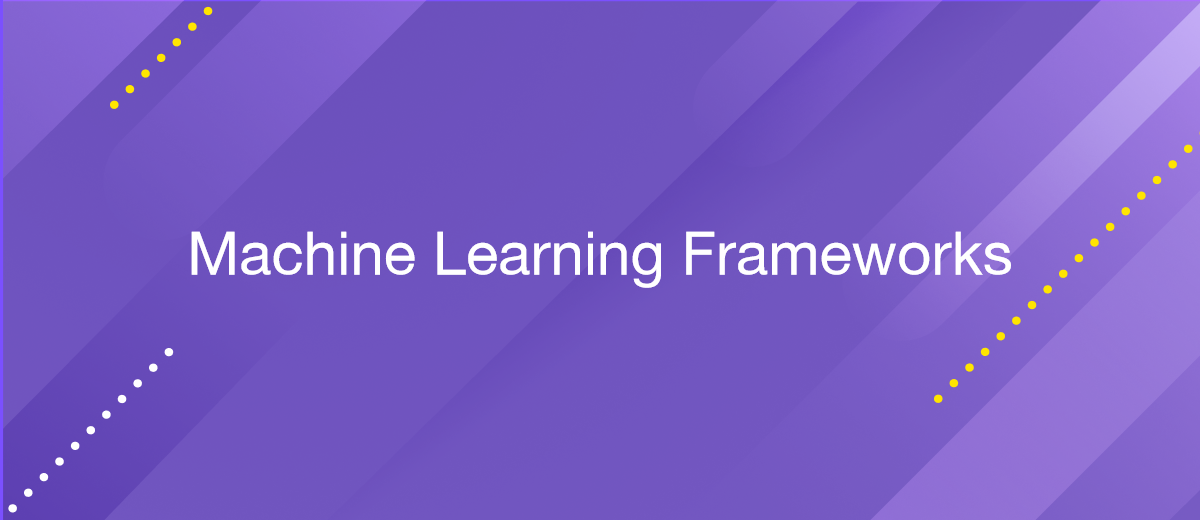Top 5 Machine Learning Frameworks
The implementation of machine learning technologies by businesses has been demonstrating stunning results for several years now. Specialized platforms for ML model developers – frameworks – play a significant role in this process. In this article, we will tell you what they are and introduce you to the 5 most popular machine learning frameworks in 2024.
What Are Machine Learning Frameworks
A machine learning platform is a set of pre-installed tools, code libraries, interfaces, and other resources designed to develop and deploy ML algorithms. Thanks to such systems, developers can optimize their workflow without wasting time learning and writing program code from scratch. Their use makes it possible to simplify and speed up the training procedure of ML models, automating routine operations.
Machine learning frameworks have a fairly simple and clear interface, accessible for understanding by both experienced and novice specialists. The functions and structures included in such platforms facilitate the implementation of many complex or repetitive development processes. With them, it becomes much easier and faster to process and visualize data, build, optimize, test models, and more.
Specialized platforms for ML model developers free them from the need to understand the mathematical and statistical principles on which machine learning algorithms are based. They help to significantly increase the speed and efficiency of all stages of the procedure, organizing and streamlining key processes. Such software packages have a standardized method for setting up ML algorithms without adding basic code.
Most machine learning frameworks are developed in Python, as it offers intuitive syntax and a huge selection of specialized libraries. This programming language makes it easy to work with large amounts of data, implement complex algorithms, and visualize results. The most popular and in-demand Python machine learning frameworks among ML developers in 2024 are TensorFlow, PyTorch, Theano, Apache Spark, and Scikit-learn. We suggest that you familiarize yourself with their specifics and capabilities.
TensorFlow
TensorFlow is one of the most famous open-source machine learning frameworks, released by the Google Brain lab in 2015. The universal end-to-end platform contains a solid set of libraries and working tools for training and deploying ML models.
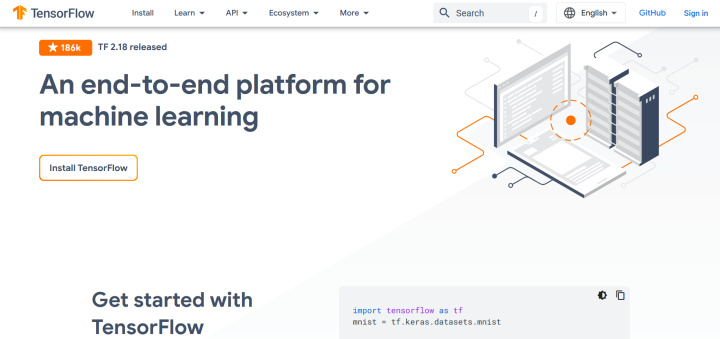
Key features:
- With this system, developers can create, customize, and deploy machine learning algorithms through high-level APIs like Keras.
- The framework provides several levels of abstraction, allowing you to choose the best option for a particular model.
- The libraries are free, but Google charges a fee for the resources needed to run the tools.
- TensorFlow enables you to deploy machine learning models in a variety of ways: on your local device, in the cloud, in your browser, and more.
- The platform supports API integration with Python and C applications. Integration is also available for C++, Java, JavaScript, Go, and Swift programs – with no guarantee of backward compatibility. There are third-party packages for MATLAB, C#, Julia, Scala, R, Rust, and others.
- The framework helps developers solve problems of varying levels of complexity. It can be used for regression, deep learning, neural network activation, and much more.
- TensorFlow is suitable for beginners, allowing them to make predictions on a given data set. It is also useful for experienced developers. They use the platform to prepare multiple data pipelines, transform them, and configure all the layers and parameters of the model.
PyTorch
PyTorch is one of the main competitors of TensorFlow. It is deservedly considered one of the best machine learning tools and frameworks. Created on the basis of open-source Torch libraries, the platform was introduced in 2016 by the Facebook AI Research (FAIR) team. Like TensorFlow, the PyTorch system runs on CPU and GPU, performing regression, classification, neural network activation and a number of other tasks necessary for training models.
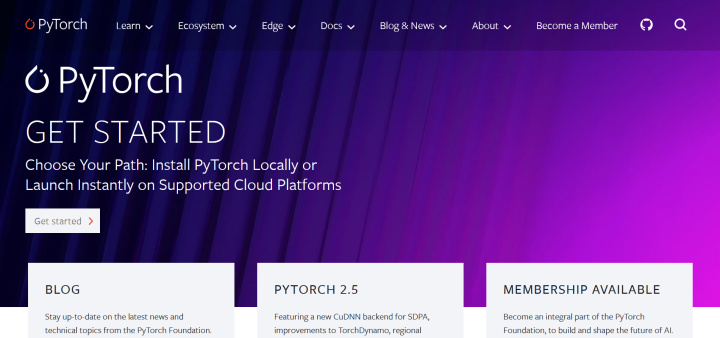
Key features:
- The server part of the torch.distributed framework provides the ability to scale distributed training and optimize the performance of ML models.
- PyTorch is one of the machine learning frameworks on Python and can be used without the online Lua compiler.
- The framework requires more manual work to configure models compared to TensorFlow and uses a more traditional object-oriented programming approach using classes.
- The TorchScript tool provides smooth switching between active and graphical mode.
- PyTorch offers an accelerated model training process. The speed gain may not be significant for small models, but it is significant for large projects.
- The platform has a number of useful ML libraries: Captum – for model interpretability; PyTorch Geometric – for deep learning on graphs; Skorch – for compatibility with Scikit-learn.
Theano
Theano is an open-source library that is widely used in solving deep learning problems and developing ML and AI algorithms. It allows developers to more effectively evaluate and manage mathematical expressions, including multidimensional arrays.
The project was presented by specialists from the Montreal Institute for Learning Algorithms (MILA) in 2007. Like other popular machine learning frameworks, Theano is created in Python and is designed for developing high-speed applications running on central and graphics processors.
Key features:
- Dynamic C code generation allows expressions to be evaluated faster.
- The platform's versatility and adaptability facilitate smooth acceleration of code processing on CPUs and GPUs, helping researchers solve complex problems through parallel processing.
- Theano delivers the highest performance when integrated into a GPU, significantly outperforming most CPUs.
- Developers can transform models into program code via NumPy and the framework's own libraries. This is of great benefit when creating large-scale neural network algorithms.
- Theano automatically routes suitable tasks to the GPU and can run the same code on either the CPU or the GPU. It also performs internal refactoring and optimizes computations.
- The platform compiles certain functions into non-C code. This compilation improves computational performance, allowing complex mathematical operations to be performed with a high degree of accuracy and reliability.
Apache Spark
Apache Spark is an universal, open-source engine for processing large data sets. Today, it is one of the most popular machine learning frameworks and libraries. It was released by a group of researchers at the University of California, Berkeley (USA) in 2014 and is now widely used to develop AI and ML models.
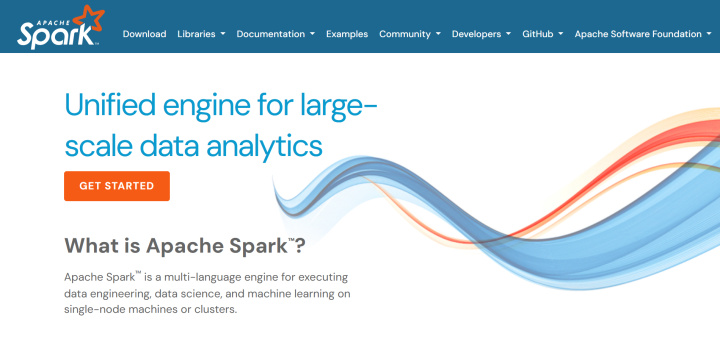
Key features:
- The platform provides a set of powerful tools for creating machine learning algorithms, business analytics, and streaming data processing.
- The engine automatically distributes tasks across large computer clusters, performing operations with high fault tolerance and scalability.
- The Spark ecosystem easily integrates with a number of popular ML, SQL, BI, and data science frameworks, including TensorFlow, PyTorch, Pandas, Power BI, Apache Superset, and others.
- Caching data in memory when performing multiple operations in parallel speeds up the processing of large datasets. This happens by reducing the number of read and write operations.
- Processing streaming data in mini-batch format with simultaneous RDD transformation in real time.
- Apache Spark is a multitasking engine that can handle a number of tasks simultaneously, including real-time analytics, ML model training, interactive queries, and graph processing.
- The platform supports a range of coding languages and technologies, including Java, Scala, Python, R, and SQL. It also supports GPUs, CAPI Flash, RDMA, FPGA acceleration, and the latest ML frameworks.
- Spark provides streaming and SQL programming models with MLlib and GraphX support. They are used to optimize the development of programs for machine learning, SQL query processing, graphs, and data streams.
Scikit-learn
Our review of the best machine learning frameworks is completed by the Scikit-learn platform. This free library has an impressive set of tools for creating and deploying machine learning models. It appeared in 2007. Like other well-known analogues, the system is written in Python.
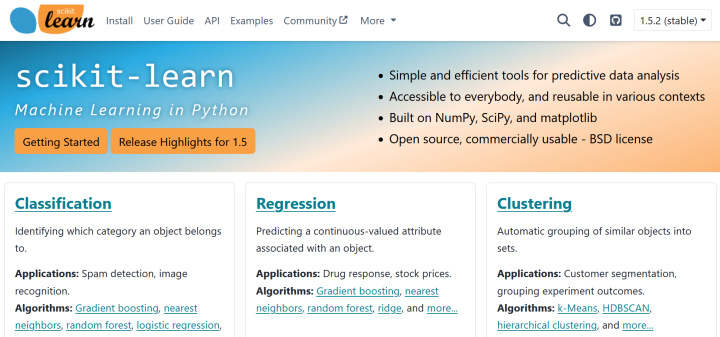
Key features:
- The platform is based on the Python libraries NumPy, SciPy, Matplotlib, and Pandas. They are fully compatible.
- The framework supports a range of operations including model selection, classification, data preprocessing, dimensionality reduction, regression, cluster analysis, and so on.
- Developers can use Scikit-learn's built-in, ready-made datasets to test their models.
- The platform is open source and has a free BSD license. This makes it free even for commercial use.
- The framework is ideal for preparing data for training ML algorithms. Its tools allow for normalization and standardization, encoding of categorical variables, and other operations.
- Scikit-learn does not provide comprehensive support for neural networks, reinforcement learning, association rule learning, and self-organizing maps.
Conclusion
The active spread of machine learning makes it increasingly useful and in demand in various business areas. With the development of technologies, companies are massively implementing ML, which increases the demand for frameworks for automating and optimizing the model training process.
The frameworks for machine learning presented in this article are among the most effective tools in this area. TensorFlow, PyTorch, Theano, Apache Spark, and Scikit-learn make machine learning easier to access. Using frameworks significantly reduces the time and effort spent on developing ML and AI algorithms. This makes machine learning accessible to a wide range of users. In the context of growing competition, companies implementing modern ML technologies receive significant advantages, becoming more flexible and innovative.
Do you want to achieve your goals in business, career and life faster and better? Do it with ApiX-Drive – a tool that will remove a significant part of the routine from workflows and free up additional time to achieve your goals. Test the capabilities of Apix-Drive for free – see for yourself the effectiveness of the tool.
